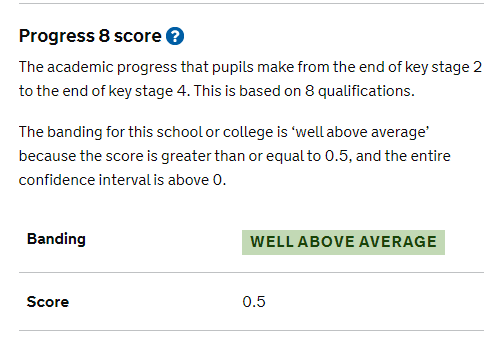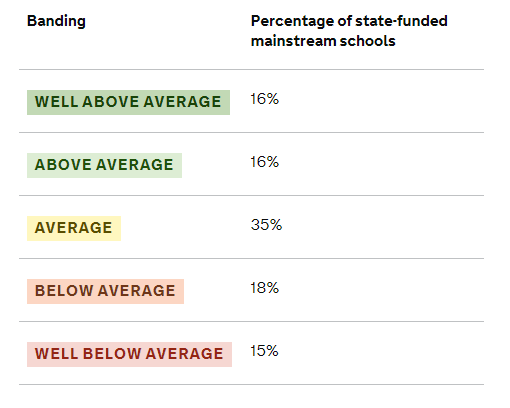Assessment & Reporting
Reporting at KS3
In KS3 students are given a progress statement, behaviour for learning grades for both classwork and home learning and once a year they are given targets from their subject teachers.
The progress statement given by the teacher is indicative of the individual student’s progress in the subject relative to their KS2 attainment. Our expectation would be that students make “expected progress”, when teachers give this statement, they are indicating that a student is on track to get a grade within their expected grade range at GCSE for their subject.
Where progress is “limited” across several subjects then the school will look at how we can best support the student with their work. If the limited progress is only in a few subjects, then individual department areas may look at how to best support the student in the classroom.
The first report in the Autumn term for Year 7 will contain behaviour for learning grades only, as teachers will still be at an early stage of assessing student performance when these reports are filled in.
If you would like more information on subject content in a particular subject area, please see the curriculum guide for KS3 on our website: https://www.thornden.hants.sch.uk/curriculum/subjects.
|
Progress statement |
What this means |
|
Better than expected progress based on KS2 attainment. |
If the student continues to make better than expected progress, then they are giving themselves the foundational knowledge and skills which will give them the potential to achieve GCSE grades above their expected grade range. |
|
Expected progress based on KS2 attainment. |
If the student continues to make expected progress, they are giving themselves the foundational knowledge and skills to achieve a grade within their expected range. |
|
Some progress based on KS2 attainment. |
If the student continues to make some progress, they may not achieve a grade within their expected range. |
|
Limited progress based on KS2 attainment. |
If the student continues to make limited progress, they are unlikely to achieve a grade within their expected range. |
Expected KS4 grade ranges based on the student's performance in KS2 SATs in Year 6.
|
KS2 APS range |
KS4 Expected grade range at Thornden |
|
KS2 APS ≥ 110 |
6-9 |
|
100≤ KS2 APS< 110 |
4-7 |
|
KS2 APS < 100 |
2-5 |
In addition to the progress statements, there will be target statements on the report card, which will give an indication of what a child can do to either maintain their good progress or to help them make better progress in a subject. These target statements are given once a year.
What does progress at Thornden look like across 5 years of education?
Outcomes at the end of KS4 are measured nationally by a “Progress 8” measure. Schools are given an average of all the students' individual Progress 8 scores. This score is based on comparing individual students' grades to the average grades of every student in the country who had similar prior attainment at KS2.
The student is then given a score above or below 0 (or 0 if they are at the average).
The average score of all students in a school becomes the "Progress 8" score for the school. Since the measure was created, the Progress 8 score at Thornden has always been positive, and we have always been at the top of the progress 8 scores in Hampshire. This means that, on average, students at Thornden outperform progress made by their peers nationally.
The two most recent example scores are from 2022, where our Progress 8 score was 0.61 and in 2023, where our Progress 8 score was 0.5. This places the school in the “well above average" category for progress.
If a student is given expected progress grades in their subjects at KS3 then they will be on the right path for success at KS4.


Core (non GCSE) PE reporting
The PE department will be using a separate grading system for Core PE which will give you an indication of student performance across 3 areas: Head, Heart and Hands, where students will be given a developing or secure grade in award levels from Bronze to Diamond.
Core PE grades will be given in Spring and Summer terms for Year 7 and at the start and the end of the year for Years 8 and 9.
Please see the PDF documents below for information on the award levels and what they mean for each category.
Reporting at KS4 (Year 10 and Year 11)
At the start of year 10, we provide a report in the first term which is designed to give you an early indication as to how positive your child’s learning behaviours are, in their GCSE subjects, using behaviour for learning grades.
At such an early stage in the GCSE courses, staff will not have collected enough summative or formative assessment to provide a current working GCSE grade.
Subsequent reports will contain current working GCSE grades, with the spring Year 10 report indicating a current GCSE grade range.
Current working grades are based on assessments of the units of work that students have completed up to the point of reporting. If they had a GCSE based only on this content, then this is an indication of what the outcome of that assessment would be.
The summer report in Year 10 and the reports in Year 11 will indicate a current working grade and trial exam grades when they have been taken.
GCSE grades are on a scale of 9 to 1, where 4 is a standard pass and 5 is a strong pass. Grade 9 is better than an A* on the previous GCSE grading scale.
You can read more about GCSE grades on these webpages:
https://ofqual.blog.gov.uk/2018/03/02/gcse-9-to-1-grades-a-brief-guide-for-parents/
https://www.bbc.co.uk/news/education-48993830
Reporting on Behaviour for learning
In all reports, students will still receive grades for behaviour for learning in class and home learning (see the PDF file at the bottom of this page, for details on these) as well as a statement regarding their progress.
